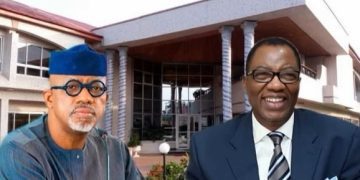Thus, when MultiChoice’s CEO, Byron Du Plessis, gave unsatisfactory justifications for price jerk-up in Nigeria, especially without corresponding hike in South Africa, what the people see is a monopolist that is unafraid of the segregationist implications of market’s response to its price tyranny. It is on this score that I agree with this consumer rights protection group that the National Broadcasting Commission (NBC) must be bold in breaking the monopoly of MultiChoice. Nigerian consumers of this viewing product should not be chained to a spot in the pay-TV sector
By Festus Adedayo
There doesn’t seem to be two ways of articulating the Nigerian situation today other than that the people are hurting as they suffer multiple emotional pains. They hurt on two prongs. One, astronomic increment in prices of goods and services and second, government regulatory agencies’ perceived inability to tame the greed of service providers. However, wherever a government agency goes against the grain to fight for hurting Nigerians, its fight should become the people’s fight.
Last week, I stumbled on a report in the Business Day newspaper which articulated South African MultiChoice’s binge of discriminatory pricing. While the usual complaints by service providers range from skyrocketing exchange rate and huge cost of providing services, but when comparative national favouritism and self-perception of tin-demigoddess slip into the equation, it becomes a matter of huge national concern. MultiChoice, you will recall, is a South African company. Complaints of price upward jerking at the drop of a hat have dogged MultiChoice from time immemorial. To many Nigerians, whenever the South African company looks through the windows and sees that the day is foggy or rainy, it slams its Nigerian users of its DStv and GOtv services price increments at its whims.
The most recent of its audacious whims has got Nigerians asking whether they have a government that caters for their interest or whether any regulatory agency that could come to their aid exists. Recently, MultiChoice woke up and literally saw a foggy day. It then imposed an arbitrary 21% price increase, effective March 1, 2025, which again riled Nigerians. What makes MultiChoice’s audacity more nauseating was that, about this same time it slammed Nigerian consumers this price jerk, it reduced prices of the same services for its South African subscribers by up to 38%, “to enhance value”. Nigerians saw this Janus approach to their welfare by MultiChoice as the proverbial case of the hunting dog which is quick at calming its own puppies’ frayed nerves with its motherly milk while pouncing on the babies of the grasscutter with a malicious rout. Why was what was sauce for MultiChoice’s goose not sauce for its gander? Nigerians ask.
In that Business Day report, a group known as Save the Consumers, a non-governmental consumer rights advocacy group, raised the consciousness of Nigerians over this arbitrariness and MultiChoice Nigeria’s ill treatment of Nigerians as if they had no government agency that could come to their aid. It would be recalled that in May, 2024, the South African company had made same complaints on operation costs which it said necessitated an increment of prices in Nigeria. I am not aware that it made same adjustment in its home country, South Africa. But, Nigerians got a breather when the Federal Competition and Consumer Protection Commission (FCCPC) intervened to ask for a suspension of all price adjustments pending the conclusion of ongoing investigations. Rather than heed this intervention, MultiChoice unilaterally went ahead to increase prices again by 21%, an obvious disregard, as said by Save the Consumers, to “both Nigerian consumers and regulatory authority.”
More unsettling for Nigerian consumers of MultiChoice services is that, according to the rights protection group, “in South Africa, MultiChoice has lowered fees on various products, added new channels, and introduced features that improve the user experience, all while acknowledging the financial pressures faced by South African households.” Are Nigerians not facing same pressure which should make a humane organization feel for them?
The rights protection group was of the opinion that, “in South Africa, MultiChoice has lowered fees on various products” and that “this double standard, lowering prices at home while increasing them in Nigeria, amounts to economic discrimination and reinforces long-standing concerns about MultiChoice’s exploitative approach toward the Nigerian market” which I agree with absolutely.
Citing the usual guile with which many enterprises hoodwink consumers in Nigeria, MultiChoice cited “inflation in Nigeria” as justification for the hike and promised that, with the hike in prices, it would afford Nigerian users an opportunity for it to deliver “world-class content”. Experience has shown Nigerian consumers that when companies offer such shibboleth, what the people face, as it is done at present with MultiChoice is, in the words of the consumers’ rights protection group, are “repetitive content, frequent service disruptions, and poor value for money.” Service fairness, rather than punitive pricing, is what Nigerian consumers need today. It is said that, in South Africa, MultiChoice has lowered fees on various products. Why is Nigeria then an exception?
Thus, when MultiChoice’s CEO, Byron Du Plessis, gave unsatisfactory justifications for price jerk-up in Nigeria, especially without corresponding hike in South Africa, what the people see is a monopolist that is unafraid of the segregationist implications of market’s response to its price tyranny. It is on this score that I agree with this consumer rights protection group that the National Broadcasting Commission (NBC) must be bold in breaking the monopoly of MultiChoice. Nigerian consumers of this viewing product should not be chained to a spot in the pay-TV sector.
This can only be done by liberalizing the market and paving way for more players in the sector. Nigerian consumers must also be made to know that it is patriotism to migrate to alternative platforms. A reversal of the March 2025 price hike is a must.
•Opinions, positions or thoughts expressed here are personal and strictly of the writer/ author and do not represent the views of The Daily Crucible.









































